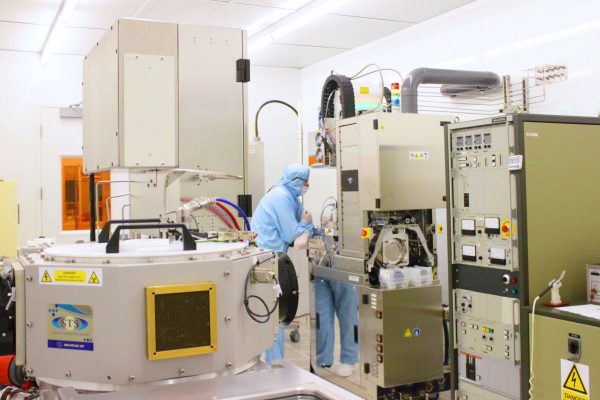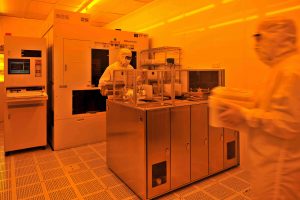The Scottish Microelectronics Centre (SMC), a research facility based within the School of Engineering at the University of Edinburgh, is helping technology companies to manufacture critical parts for use in intensive care units during the Covid-19 pandemic.
The SMC ordinarily works with a range of commercial and academic clients, specialising in MEMS (micro-electromechanical system), semiconductor, and nano fabrication – a range of cutting-edge engineering manufacturing techniques which take place at very small scales in the tightly controlled environment of a cleanroom.
The research facility is currently supporting two companies – Druck and Pyreos – to meet the demand for specialist sensors used in ICUs (intensive care units) and the wider community.
Druck, a Leicestershire-based firm which is part of Baker Hughes, develops and manufactures highly accurate pressure sensing devices and instruments for use in a range of industries including healthcare.
Druck’s pressure sensors are used to test medical support equipment for pressure leaks before it reaches NHS hospitals, and are found in a range of devices and systems that require pressure or suction while operating, such as ventilators, blood pressure monitoring systems, and anaesthetic instrumentation.
In particular, the company relies on the SMC’s specialist staff, cleanroom facilities, specialised silicon wafer grinding and deep etching capabilities to produce the sensors currently found in PACE 5000/6000-equipped ventilators and UNIK5000 sensors for Covid-19 testing kits.
Pyreos, based in Edinburgh, is another business which uses the facility’s cleanroom facilities and services to produce specialist sensors for healthcare applications. These proprietary sensors are used both for anaesthesia and capnography – a process that monitors the concentration or partial pressure of carbon dioxide (CO2) in a patient’s respiratory gases.
Pyreos is one of only a handful of global suppliers of the core gas sensors for capnography. Demand from existing customers in Europe and Asia has grown by several multiples, while more of the global top-five suppliers have also approached the company to start urgent projects.
Pyreos CEO Andrew Wallace explained, “Demand for medical products has increased several times over in just a few weeks. Orders for our medical and related products have already locked in 50% annual growth at Pyreos in just the first few months of the year. We value the SMC’s openness to quickly agreeing safe working practices and providing a way to accelerate production.”
“With the SMC’s support, we are helping customers meet the global demand for ventilators and ancillary equipment. By utilising our unique intellectual property and technology skills, Pyreos is helping to position Scotland as a global centre of excellence in the production of medical equipment.”
Dr Peter Lomax, the SMC’s Senior Experimental Officer, added: “It is great that we have been able to use University of Edinburgh research facilities to help UK companies meet the international challenges presented by coronavirus.”
Employees of both companies have been recognised by the UK government as key workers during the Covid-19 response effort, thanks to their role supporting the manufacture and maintenance of critical medical equipment and other essential industries with a major global customer. The company is also working with other established capnography manufacturers to support accelerated development programmes launched during the pandemic.




















